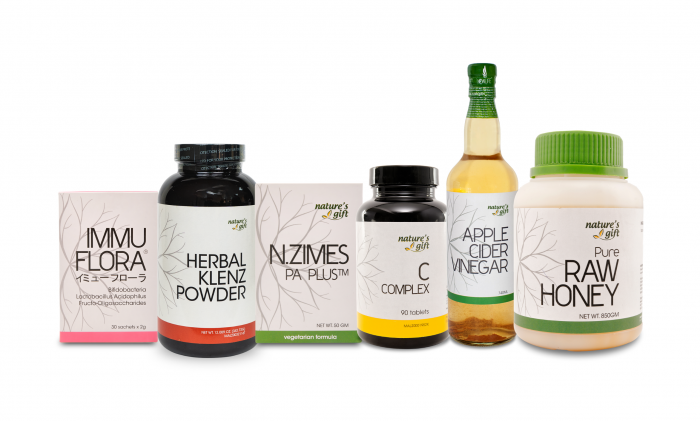Why Is Digestive Health Important?
Each day, we consume thousands of calories in order to keep the body fuelled. Along with these calories we also consume nutrients that are necessary for the cells in our bodies to function. No matter in what form these calories and nutrients are delivered, they all have to pass through the digestive system.
The digestive system is the second largest system in the body. It consists of organs that are responsible for the digestion of food, the absorption of nutrients that power the rest of the body, and also the elimination of waste from the body. Health experts say that over 80% of chronic diseases are caused by poor digestive health – often due to poor function in either one of two areas: (1) the absorption of nutrients, or (2) the elimination of toxic wastes from the body.
Symptoms of Poor Digestive Health
Very often, people struggle with digestive health issues for many years without doing anything about it. As not all of them cause pain or discomfort, some people may become accustomed to having such “small” health challenges, without realizing that the root causes of these issues may have far reaching consequences. Some of the most common digestive health problems are: constipation, reflux, irritable bowel syndrome (IBS), gastritis, chronic diarrhoea, and inflammatory bowel disease (IBD). While medical intervention can be used to treat the symptoms of some of these conditions, or to manage pain or discomfort, long-term treatment will often require lifestyle adjustments coupled with therapeutic nutritional programmes.

Maintaining a Healthy Environment in the Digestive System
While the body has its own checks and balances for maintaining a healthy gastrointestinal environment, our diets are generally not kind to the digestive tract, and even minor digestive disorders such as constipation are a warning sign. There are a few key dietary areas that are essential for maintaining a healthy digestive system, which are within our control based on the choices that we make each day.
Enzymes – the body manufactures enzymes to facilitate millions of different processes within the body which include the digestion of food and even brain function. Fruits and vegetables are rich in live enzymes; however, these enzymes are killed by high temperature during the cooking process. As a result, most people suffer from an enzyme deficiency as the body’s supply is depleted over the years, leading to poor digestion and absorption or nutrients.
Friendly Bacteria – probiotics have long been established as important pillars for maintaining a healthy gastrointestinal environment. Lifestyle factors such as an unhealthy diet, smoking, alcohol consumption, and the ingestion of antibiotics through prescription medication or commercial meats can all lead to a depletion of probiotics in the body.
Fibre – most of the carbohydrates that we consume are processed to remove the fibre content. This makes white flour or rice last longer and taste better, however it also means our diets have insufficient fibre. Fibre is important as it forms bulk in the colon and helps to promote healthy bowel movement. Fibre deficiency can lead to the accumulation of encrustations in the colon, which leads to poor digestive health and “auto-intoxication”.
Vitamin C – collagen needs vitamin C in order to function in the body. They work together to preserve the integrity of tissue cells. Vitamin C helps to promote digestive health by keeping the intestinal walls healthy and lowering inflammation in the digestive tract with its antioxidant effects.
Another important step would be to avoid foods or eating habits that aggravate or irritate the digestive system. Some of these are:
- Avoid spicy, fatty or fried foods.
- Alcohol and coffee are also known to cause digestive discomfort for those who have gastritis.
- Smoking, overeating, and being overweight can also cause digestive problems.
- Certain medications such as aspirin, non-steroidal anti-inflammatory drugs (NSAIDs) like Ponstan, antibiotics, or diabetic medications may irritate the digestive system. Only take prescription medications when absolutely necessary and under the guidance of an experienced doctor.
- Stress and anxiety can also cause digestive problems such as IBS.
- A lack of dietary fibre is another very common, but somehow largely overlooked cause of digestive problems such as constipation.
- Other nutritional deficiencies such as low levels of digestive enzymes or friendly bacteria in the gut can result in poor digestion or digestive problems, so supplementation may be necessary in order to improve digestive health in the long run.
Foods that Are Friendly to Your Digestive Tract
Here is a list of “digestion-friendly-foods” that you should look into including in your daily diet. They help to contribute towards a healthy digestive system while supplying the body with essential nutrients:

- Yoghurt – contains friendly bacteria and is easy to digest unlike other dairy products.
- Apples – a rich source of pectin, which is a soluble fibre that relieves constipation and reduces inflammation in the colon.
- Chia seeds – an excellent source of fibre and works as a prebiotic to promote the growth of friendly bacteria.
- Papaya – rich in the digestive enzyme papain.
- Whole grains – rich in fibre, promotes healthy bowel movement.
- Beet root – rich in fibre.
- Ginger – accelerates gastric emptying by moving food to your small intestine quicker, thus reducing your risk of heartburn, nausea and discomfort.
- Kimchi – rich in fibre and friendly bacteria.
- Dark green vegetables – an excellent source of insoluble fibre. Adds bulk to stool and quickens its pace through the digestive tract.
- Peppermint – eases symptoms of IBS, bloating, and digestive
discomfort.
Essential Health Foods / Supplements for Healthy Digestion\

- Immuflora®
A proprietary product found only at NewLife™, each sachet of Immuflora® contains 10 billion Bifidobacterium longum, 1 billion Lactobacillus acidophilus and 200mg Fructo-Oligosaccharides (FOS). Made in Japan with breakthrough technology that allows it to pass through the stomach unharmed to emerge intact in the intestines.
- Herbal Klenz Powder
Contains premium dietary fibre along with detoxifying herbs that help to promote healthy bowel movement and digestive health. Regular use relieves constipation, reduces inflammation in the colon, and helps to detoxify the body.
- N.Zimes PA Plus™
N.Zimes PA Plus™, a proprietary blend unique only to NewLife™, is the result of eight decades of research and expertise in the study and safe handling of enzymes. This product is specially formulated to provide digestive support throughout a broad range of conditions. It is composed of a comprehensive blend of microbial enzymes.
- C Complex
In addition to its well-known antioxidant and immune-boosting effects on the body, vitamin C is also an essential nutrient for digestive health. It has an osmotic effect in the digestive tract, which pulls water into the intestines, helping to soften stool and promote healthy bowel movement.
- Apple Cider Vinegar
Helps to improve digestive health and treat conditions such as
gassiness or constipation. Apple Cider Vinegar is rich in enzymes and electrolytes, and also stimulates digestive juices that help your body to break down food.
- Pure Raw Honey
In the digestive tract, components in honey act as prebiotics that help to promote the growth of friendly bacteria. Honey also helps to neutralize gas and soothe the digestive system.

